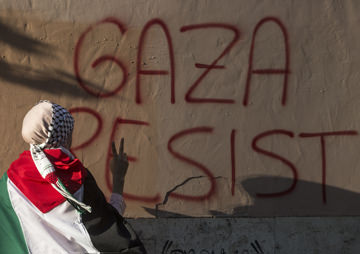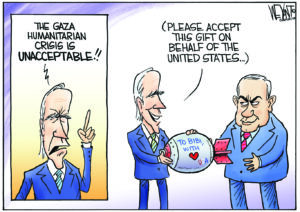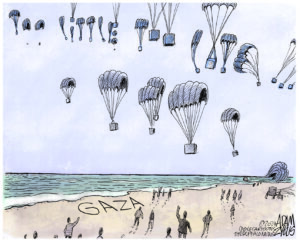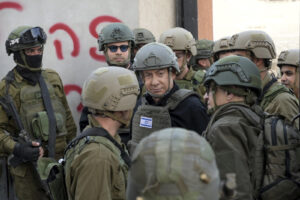Gaza Psychologist Becomes Trauma Victim, Tragically Losing 6 Close Relatives in Recent Attack
“You are,” Dr. Hassan al-Zeyada says, “like a prison doctor treating a victim of torture, making the prisoner healthy to be interrogated and tortured again.” A protester at a demonstration in Rome last month against the recent violence in Gaza. giulio napolitano / Shutterstock.com
A protester at a demonstration in Rome last month against the recent violence in Gaza. giulio napolitano / Shutterstock.com
“You are,” Dr. Hassan al-Zeyada says, “like a prison doctor treating a victim of torture, making the prisoner healthy to be interrogated and tortured again.” Al-Zeyada finds himself grieving the loss of his mother, three of his brothers and other relatives as he prepares to counsel fellow Palestinians, as he has for decades, who’ve experienced similar trauma.
The New York Times:
Dr. Zeyada is not the only Palestinian caregiver to become a trauma victim. In the three weeks of attacks that Israel has said are meant to root out militant rocket fire and destroy clandestine tunnels into Israel, one of Dr. Zeyada’s colleagues at the program lost a brother, and their boss, Dr. Yasser Abu Jamei, lost 26 members of his extended family, including 19 children, in a single bombing.
It is difficult — even absurd, the clinicians say at their darkest moments — to try to mend psyches in the Gaza Strip, where even in calmer times the conditions are hardly conducive to psychological health, and safety is never more than provisional under the many cease-fires that have come and gone.
People cannot flee from Gaza; Israel and Egypt keep their borders virtually sealed. Residents can flee their neighborhoods, but even United Nations schools being used as shelters in Gaza have come under deadly fire. And in downtown Gaza City, where Israel has urged people to go for safety, Israeli airstrikes have repeatedly hit apartment buildings packed with residents and refugees. One strike collapsed most of a building and killed the family of a bank employee who had moved to Gaza City because of Israeli instructions. … One-third of Gazan children showed signs of post-traumatic stress disorder even before the latest outbreak of fighting, according to Dr. James Gordon of the Washington-based Center for Mind-Body Medicine, which runs a program in the territory. Now, with the death toll for the last three weeks exceeding 1,500 Palestinians — relative to the population, the equivalent of nearly 200,000 deaths in the United States — nearly every Gazan has heard or witnessed shelling, and most know someone personally who was killed or injured.
—Posted by Natasha Hakimi Zapata
Your support matters…Independent journalism is under threat and overshadowed by heavily funded mainstream media.
You can help level the playing field. Become a member.
Your tax-deductible contribution keeps us digging beneath the headlines to give you thought-provoking, investigative reporting and analysis that unearths what's really happening- without compromise.
Give today to support our courageous, independent journalists.






You need to be a supporter to comment.
There are currently no responses to this article.
Be the first to respond.